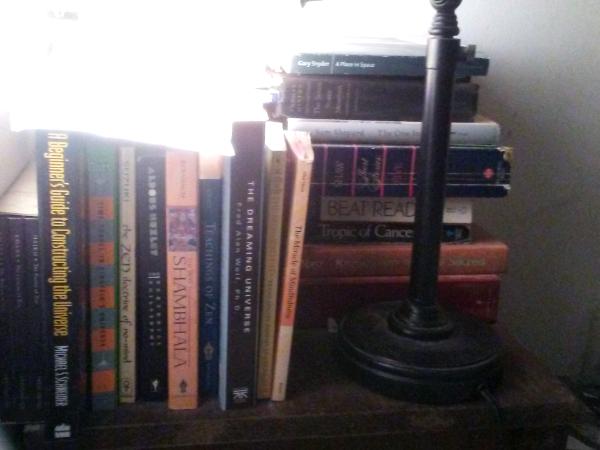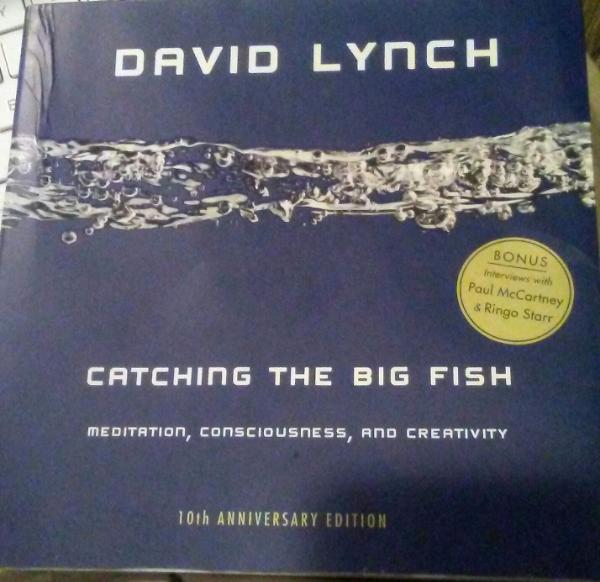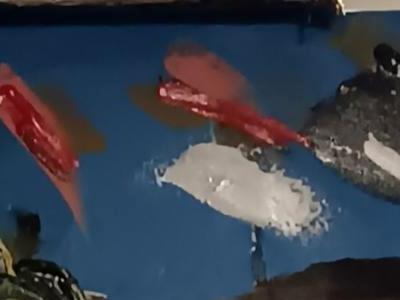Howls of a Primitive Abstract Painter | 12/31/19
In my approach to art, reading is essential. Inspiration can come from ideas, individuals, phrases, titles, or the totality of a book. This is the list of books which I (or mostly) have completed in 2019.
Where the Heart
Beats, Kay Larson |
| The Moon and Sixpence, W. Somerset Maugham |
| Silence: The Power of Quiet in a World of
Noise, Thich Nhat Hahn |
| The Upanishads, Swami Parmananda (editor) |
| The Spirit of Zen, Alan S. Watts |
| Franny and Zooey, J.D. Salinger |
| On the Road, Jack Kerouac |
| The Dharma Bums, Jack Kerouac |
| The Best Minds of My Generation, Allan Ginsberg |
| The Mother Wart, Dylan Krieger |
| The Razor's Edge, W. Somerset Maugham |
| Little Birds, Anais Nin |
| Bad Behavior, Mary Gaitskill |
| The Strange Case of Dr.Jekyll and Mr.
Hyde, Robert Louis Stevenson |
| Underland: A Deep Time Journey, Robert Macfarlane |
| The Collected Schizophrenias, Esme Weijun Wang |
| The Power of Different: The Link Between
Disorder and Genius, Gail Saltz, M.D. |
| Touched With Fire: Manic-Depressive
Illness and the Artistic Temperament, Kay Redfield Jameion |
| The Old Ways - A Journey On Foot, Robert Macfarlane |
| Outside Looking In, T. C. Boyle |
| The Living Mountain, Nan Shepherd |
| Lou Reed, Anthony DeCurtis |
| The Wild Places, Robert Macfarlane |
| Ninth Street Women, Mary Gabriel |
| A Lesson Before Dying, Ernest Gaines |
| The Zen of Creativity, John Daido Loori |
|
Be the first to post a comment.
|
12/29/19No.
Don't forsake your children. Don't abuse your significant other(s). Don't physically or verbally or emotionally hurt people.
Don't commit consent violations.
Don't be rude to your gallery owners, patrons or potential benefactors.
Learn how to say, thank you, and always offer a cup of coffee to anyone who takes the time to visit your studio to see your art.
And be patient with people who talk about art with you who may ask what you perceive to be stupid, silly, or - worse yet - patronizing questions? They do not know any better, and that is why they are asking, and their asking means they are interested. Appreciate their interest, if not their questions.
These aren't platitudes I offer so that you will go far in the art world. It is just good to be kind to people. I don't know why those who are artists believe that there is an either/or situation: be a great artist or be a human being. You can be both, and it won't hurt your art.
Painting can be part of your soul, but as a person you need to be whole.
So endeth the sermon. |
Be the first to post a comment.
|
12/29/19 As long as I have considered myself an artist of some sort - poet, playwright, painter - I have suffered from a little bit of mental illness. Dysthymia likely mixed with general anxiety disorder seems to be the diagnosis. I've had my ups and downs and tossed around the notion of suicide and self-destruction. And I grew up with and embraced the idea of the suffering artist. But over the past year, I have also struggled with the notion of the suffering artist and whether I have potential as a great artist if I am not suffering.
There are two books to refer you to. The first is Kay Redfield Jamison's "Touched With Fire" (1993), which provides a strong case for the link between creativity and the bipolar condition (or manic-depressiveness). Byron was one of the key artists in her book. The second is "Catching The Big Fish: Meditation, Consciousness, And Creativity" (2006) by filmmaker David Lynch.
Redfield's book was informative and insightful. Lynch's book was illuminating. And reading the chapter on suffering, he posits that the artist will in fact be more creative if he is not suffering, that suffering distracts from the ability of the artist to create. He refers to Vincent van Gogh, who, Lynch believes, "would have been even more prolific and even greater if he wasn't so restricted by the things tormenting him." (Lynch, p. 94) He goes on to opine that it was painting that gave van Gogh what little happiness he had.
Now, after contemplating this and thinking of how I felt when I created, I have to concur. When I was feeling down...really down, not just in a mood...I didn't want to create. I wanted to sit and brood and contemplate unthinkable things. When I found the energy to pick up a brush, I was almost euphoric, as though a spirit was moving within me to get me to create. I felt energized, liberated, transcendent. The dysthymia is still there, but making art helps me overcome it.
Mr. Lynch goes on to discuss how meditation can help an artist by focusing his energy, digging deeper into his consciousness, seeking out the big fish of ideas. He promotes Transcendental Meditation. I do not, not specifically. But I do lean toward mindfulness. And after reading Lynch's book, I've read "The Upanishads", am reading "The Bhagavad-Gita", re-read "The Razor's Edge," and most recently read "The Miracle of Mindfulness" and "The Zen of Creativity" to influence and inspire me and find ways to discipline myself to be more focused.
My own personal advice to artists: if you are depressed, anxious, sad, whatever, seek help. Don't let it fester. It can kill you. Once you are out of crisis or on the mend, find regular routines in life that you can use - meditation, deep breathing, mindfulness, prayer, reading, exercise - that keeps you focused and helps offer you clarity. I use some meditation (and want to learn more), walk (a favorite activity), read, and got rid of alcohol as a regular part of my life. Depressions still happen. Anxiety still festers. But I am seeking the transcendence and lucidity I need to paint, to make my art. |
Be the first to post a comment.
|
12/26/19In 2020, I may be returning to the desert with a muse and a different mindset.
Late this past year, I had a visit from owners of a gallery who expressed an interest in my older, more primitive and representative work. Work from the 2009 -2011 period which I kind of forgot about...or chose to forget...having decided to move forward with new styles or methods. And I have mostly embraced a primitive abstract approach.
But I have been revisiting the desert again, in my mind and in my heart, and some of the ideas about the desert that appealed to me. And while the paintings will likely be different - and hopefully better - than from 10 years ago, they still will continue to touch on similar themes, with a little bit of an edge. Perhaps it will be an evolution of style or thought on my part.
Painting is exploration. |
Be the first to post a comment.
|
12/21/19This past week, I read "The Zen of Creativity", by John Daido Loori. Loori was a photographer who founded the Zen Mountain Monastery in Mount Tremper, NY (just outside Kingston). The book had lots of his photographs but also a handful of small paintings by Zen monks and masters. So, I decided to try my hand at this type of painting. This ("Retreat") is one of them. There are others in the second page of the Soul Trip gallery. They are fun to do. And liberating.
As you can see, a good number are not for sale. But I will make more over time. |
Be the first to post a comment.
|
Previously published:All 135 blog entries |
